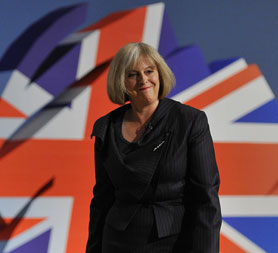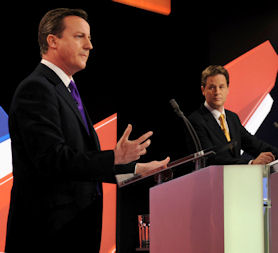Migration cap: May seeks 20 per cent cut in non-EU workers
 Gary Gibbon
Political Editor
Gary Gibbon
Political Editor
Home Secretary Theresa May says the number of migrant workers coming to Britain from outside the EU will be cut by a fifth and capped at 21,700 from next year. Gary Gibbon looks at the numbers.
The Home Secretary told MPs there would also be a minimum salary of £40,000 for firms using intra-company transfers (ICTs) to bring their own workers into the country for more than a year to do specific jobs.
But companies will still be able to bring non-EU workers into the UK on ICTs for less than 12 months providing they earn £24,000.
In a bid to meet the Government’s pledge to cut net migration from 196,000 to just tens of thousands by 2015, Theresa May said: “We will have to take action across all routes to entry – work visas, student visas, family visas – and break the link between temporary routes and permanent settlement.”
Workers who enter the country on tier two visas under the points-based system will be capped at 20,700 and these will also be limited to graduate-level jobs.
“At least 30 per cent of tier one migrants work in low-skilled occupations such as stacking shelves, driving taxis or working as security guards.” Home Secretary Theresa May
‘Exceptional talent’
However, the number of highly-skilled workers without a job offer, which was the basis for the old tier one route, will be limited to just 1,000 per year and only to those with “exceptional talent” – including scientists, academics, artists and sportspeople.
The inclusion of scientists will help address the concerns of universities who fear a cap will make it harder for the UK to attract the World’s best researchers.
Ms May said: “The old tier one – supposedly for the best and the brightest – has not attracted highly-skilled workers.
“At least 30 per cent of tier one migrants work in low-skilled occupations such as stacking shelves, driving taxis or working as security guards and some don’t have a job at all.
“So we will close the tier one general route.
“Instead, I want to use tier one to attract more investors, entrepreneurs and people of exceptional talent.”

Student visas
Student visas will also be targeted by the Government. Ms May said: “Nearly half of all students coming here from abroad are actually coming to study a course below degree level and abuse is particularly common at these lower levels – a recent check of students studying at private institutions below degree level showed that a quarter could not be accounted for.
“Too many students, at these lower levels, have been coming here with a view to living and working, rather than studying. We need to stop this abuse.”
The Home Secretary warned that the new immigration rules set out “a clear, rational approach to which workers we will allow into the UK job market.
“We have set out an approach which will not only get immigration down to sustainable levels but at the same time, protects those businesses and institutions which are vital to our economy,” she said.
One Australian scientist working in the UK says the damage has already been done.
Dr Holly Barker works at the Institute of Cancer Research in London and is part of a specialised team working to develop drugs to treat cancer.
But the recent uncertainty regarding visas for scientists means she has already decided to leave the UK and work abroad.
Holly told Channel 4 News she had lost confidence in the system here: "Since University I've undertaken six years of study to gain my PhD and the experience I now have in scientific research.
"I was able to beat 50 people to get this position - I find it really frustrating now to be so uncertain about my future in this area and the work I'm doing in the UK.
"It makes me think I should take my scientific experience elsewhere."
Holly's boss Dr Janine Erler said the situation was unfortunate: "Holly has a unique skills set that we really need to do our research.
"We recruited internationally to hire her and to lose her is a really a big dent to our research in the lab."
Missed opportunity
Britain’s largest union, Unite, accused the Government of missing a golden opportunity to root out abuse and misuse by firms of the ICT route.
Unite national officer Peter Skyte said: “The Government has spectacularly squandered the opportunity to deal with misuse and abuse of the intra-company transfer scheme in its migration cap announcement in the face of largely empty threats by big business to withdraw investment from the UK.
“The measures announced will do little to prevent employers from abusing the system, and manipulating tax and accommodation allowances to undercut UK resident workers.
“The Government has also failed to take any action to stimulate job opportunities to reduce the high unemployment rate for skilled computer science graduates and young people in general by providing employers with greater incentives to source labour from the domestic market as envisaged in its original consultation on the migration cap.”
University subsidies
The International Director of the Association of Colleges, John Mountford, warned that non-EU students who come to the UK on courses below degree level “subsidise UK universities and UK students” by going on to do degrees later.
He said: “Cutting them out will ultimately mean that UK citizens will have to pay even more for a university degree.
“The cap is a clumsy approach – to cut numbers most effectively the Government should simply administer current policy properly.
“This would reduce student numbers by removing bad practice, clamping down on ‘chip shop’ providers while supporting highly trusted providers like Further Education and Sixth Form Colleges, which specialise in high-quality education to genuine students.
“Introducing a cap will punish reputable providers to the benefit of the bad, as the unscrupulous will continue to look for loopholes.”

Cameron v CleggDuring the election campaign David Cameron
and Nick Clegg clashed over the immigration cap issue. In the second of
the three leaders TV debates, filmed by Sky News, Cameron said the
country wants and deserves "firm immigration control". Nick Clegg asked
him: "what kind of cap?"Cameron: And that would make a
difference. And what it would really achieve is getting back to where
we used to be, where we didn't have immigration questions at public
meetings, we weren't asked about it on the streets. When you knocked on
a door, nobody raised it. Why?Because the British public
was happy with the level of immigration. We knew that was a level we
could integrate and provide good health, housing and schools for
people. It's been out of control these last 13 years. That's Labour's
fault. And from all I can hear, the Liberal Democrats would make it
much, much worse.Clegg: No, David Cameron, what would the cap be?
Cameron: You'd set the cap...
Clegg: No, what's the number? Is it 10? Is it 10,000? It is 10 million?
Cameron: If you have a cap... Do you want to let me answer the question?
Clegg: Just a number
Cameron: You're reminding me of Gordon last week. It's like another
replay. The fact is, every year, you need to talk with the health
authorities, the housing authorities, the education authorities, and
business, and set a cap to achieve a very big reduction in overall
immigration levels. That can be done, we've done it in our past, we can
do it again in our future. What's required is political will from a
party that's prepared to make the difference.Clegg: David Cameron, you are... Let me get this straight, I genuinely want to
understand, you're proposing a cap but you don't know what the cap
would be. You're proposing to give people an assurance that we're going
to count people in and count people out, but you don't know how many
people.All I'm saying on the immigration debate, it's difficult, none of us have got perfect answers. But let's at least not
pretend that you can put forward these ideas which have got no
substance, haven't been thought through. At least the kind of ideas
I've been putting through are trying to deal with a really, really
difficult issue which has been brushed under the carpet for too long.
Acceptable business deal
The Business Secretary, Vince Cable, claimed the proposals “represent an acceptable deal for business operating in the UK and wanting to set up here”.
He said: “We have protected their ability to bring the skills and talent to the UK and give them certainty around their continued ability to move their global workforce.
“We are also protecting a route for scientists recognising the importance of ensuring that the UK continues to be a world-leading place to do science.”
The Director General of the British Chambers of Commerce, David Frost said: “Business will be pleased to see that the Government has taken its concerns on board.
“At the same time, businesses will hold the Home Secretary to her pledge to ensure that businesses will still have the flexibility to hire according to their needs.
“It is right that companies that require skilled workers for a specific job move to the front of the queue, as these individuals are essential for economic growth and ensuring that the UK remains competitive.”
-
Latest news
-
Ex-Trump lawyer Michael Cohen testifies at hush money trial3m

-
Racial hate speech laws being ‘weaponised’ warns National Black Police Association7m

-
‘Hard to believe so many women going through such horrors’, says woman whose baby daughter was stillborn8m

-
Damning report condemns ‘shockingly poor’ UK maternity services12m

-
People ‘expecting the West to stand by Georgia’, says opposition party leader5m

-




